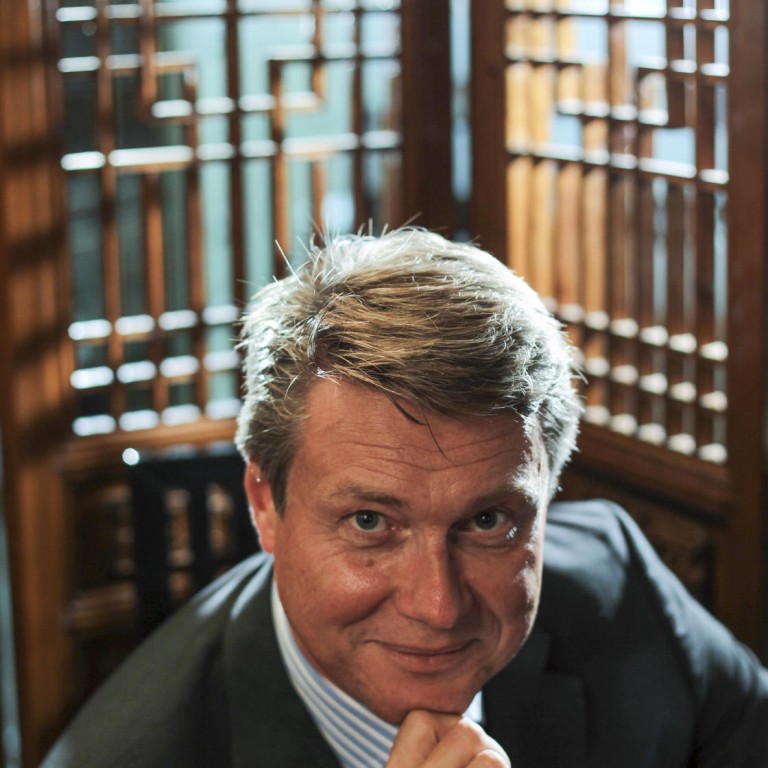
In the Spink
One of London's oldest auction houses shows commitment to Asia by moving its chairman and CEO to Hong Kong, writes Tiffany Ap
Spink chairman and chief executive Olivier Stocker is so fresh from his move from London, the walls of his Wan Chai office are completely bare when he meets with the . Highlighting the steadily growing importance of the Chinese buyer, the venerable auction house, known for its sales of stamps, banknotes, and medals, is the first major house to move its chief executive to Asia.
"I think the best way to focus everybody's mind … is to make a bold decision and a bold move," Stocker said. "We've been saying for over 20 years that Asia is important but I think if you want to demonstrate that it's really important you move a CEO and owner of business and his family to Hong Kong."
Spink, which held its first Hong Kong auction in 1986, expanded its presence here at the end of 2011 with the acquisition of stamps auction house Phila China, and fine-wine auction business Oeno China, both founded by Anna Lee. Lee, and just five other employees are in the Hong Kong office with Stocker.
"It's a small office here but will grow … this office could easily account for half of our business in the future," he says.
Stocker is not new to Hong Kong. He first lived here in the late 1980s as an investment banker with Jardine Fleming, before the group was sold to JP Morgan. He's been managing Spink for over 10 years, building his stake from 2003 onwards and eventually took over as chairman and CEO in 2005. He is here to cultivate relationships with clients, and help them build and then sell collections.
"The Hong Kong and China market has been buoyant for years. We have been coming to sell banknotes, coins and stamps for 25 years, so it's not yesterday," says Stocker.
The resiliency of the market is a great boon. Stamps, banknotes, and medals draw a different crowd of collectors than in the world of art or wine. Philately collectors are not in it for the flash. "It's not, the economy goes up, people pay crazy prices. The economy goes down, the market collapses," says Stocker
He says stamps historically have appreciated 10 per cent per annum. The market is less volatile than, say, fine art, because … it's less driven by fashions and trends.
Stocker offers a third reason Spink has been doing well, especially out of their Hong Kong and Singapore offices: the reverse flow of collectibles. Historically, expatriates from Europe would collect items in Asia and take them home. But in the past 20 years, collectors in Asia have been buying back their national heritage.
However, he's here in Hong Kong because of the next big move he anticipates - when collectors in Hong Kong and China buy not only their own heritage but other things. Much how the arrival of the Chinese buyer transformed the luxury industry, they will turn around the collectibles market, he says.
"As the Chinese are travelling to Bordeaux, they buy vineyards. Now there are around 70 vineyards that belong to mainland Chinese. If they buy vineyards for sure they will be buying old masters and old coins of Europe at some point. It has already started. We have a few advanced collectors but it's just at the top. The market has not moved in depth. My guess is anywhere between one and 10 years but that's going to be a big shift and that will totally change the way our old established markets are functioning because there will be new players who are more aggressive. That will be a dramatic change. That's why I want to be here, to witness it, experience it and participate in the process," he said.
It goes without saying that Stocker's bigger ambitions lie across the border. Its competitor, Christie's, recently generated sales of US$25 million with its first mainland auction. Christie's recently won a licence to operate in the mainland, the first major foreign auction house with such permission.
"I followed the Christie's sale. At this stage, my plate is quite full in Hong Kong … but definitely we will be more present in China in three years than today," says Stocker.
More recently, the company expanded outside of its core business to wine. It steers away from doing much promotion, selling to collectors the house has worked with for many years. Stocker says most of the wine it sells comes "direct from the chateau", and are meant to be drank today, not in 15 years. That's partly because Hong Kong's hot climate can create storage problems and also long-term collecting is limited by a lack of space here.
That's not the only lifestyle difference Spink has had to consider. Because the modern-day collector is often pressed for time, auction houses are increasingly offering an experience to go with a lot. At Spink's last wine sale for example, the winning bidder for a bottle of wine from Chateau La Lagune is also invited to a private degustation and stay at the chateau.
He said the best collectors historically are the aristocracy. "They had land. They were not working. That's why they had time to collect," says Stocker. Nowadays, people may be as rich as aristocrats, but they lack time - these people want ready-made experiences, he says. "People who have the most money today tend to have the least time," says Stocker. "[They say,] 'Oh, fantastic, a trip to France and you can stay at the chateau.' They will go for the weekend."
